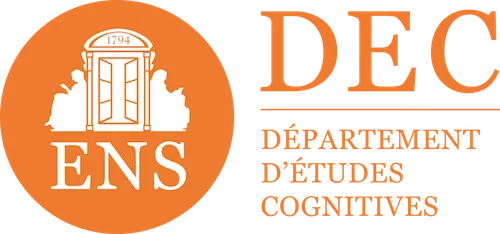
Digital learning lexicon
and apprenticeship
Adaptive learning
Learning paths that offer a different experience to each learner, for example according to their initial level and/or mistakes.
Learner
The person who is learning. A student, a student, a collaborator...
Learning by trial, error and feedback
Learning in which the learner first tries to solve a problem by himself and correct any mistakes thanks to the corrective feedback he receives.
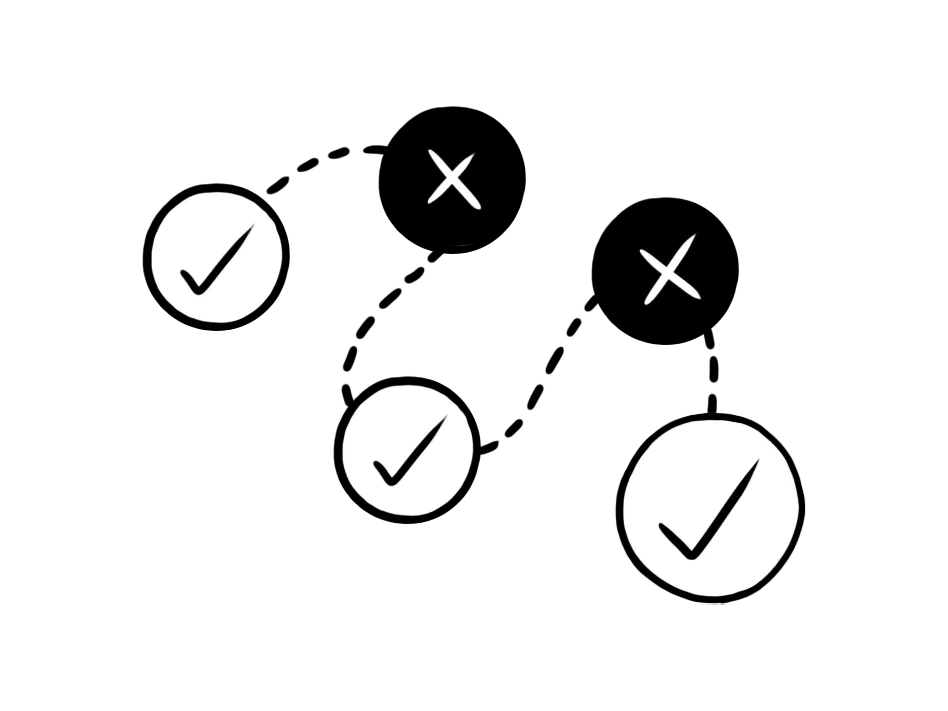
Massed or block learning
The opposite of spaced learning. When I review my entire course at the last minute, I am doing massed learning.
Automation
We say that learning is automated when it requires almost no conscious effort to be mobilized.
Blended learning
Refers to an educational path that combines face-to-face (face-to-face) and remote (remote).
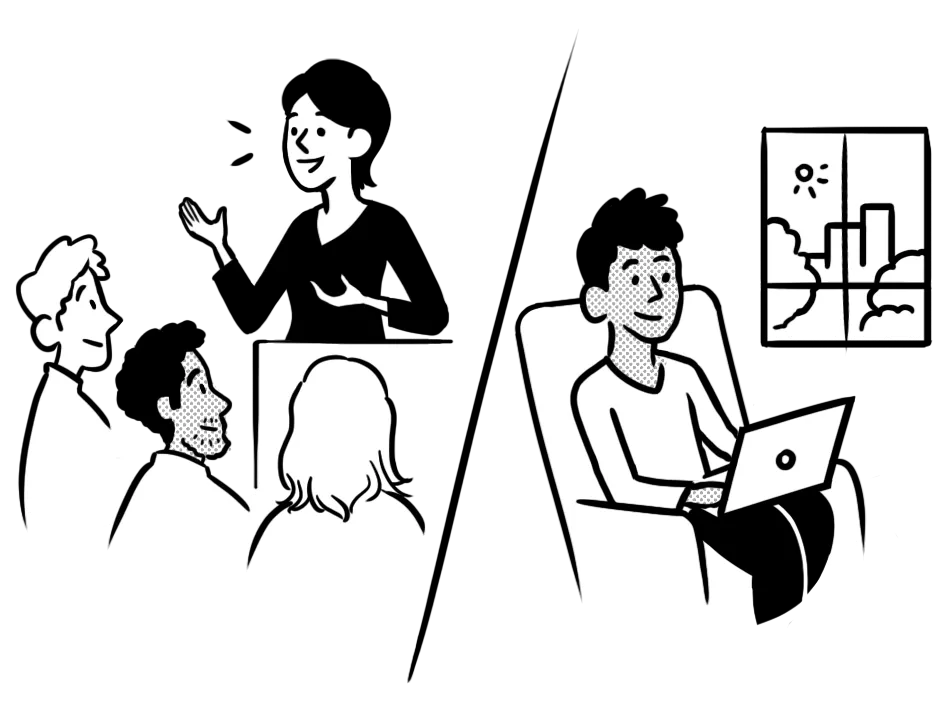
Brain training
Brain training software, or”Braintraining”, are a series of small games designed to improve the major mechanisms of our cognition such as memory, attention, logical reasoning and many others.
Sensory channel
Refers to the sense (hearing, sight, touch) through which your learner will experience your instructional content.
Cognitive load or mental load
Refers to the cost of processing information by the brain.
Memory card (or flashcard)
A card-based game with a question and an answer on the back. You draw cards one after the other, trying to answer the questions correctly, until you get rid of all your cards.
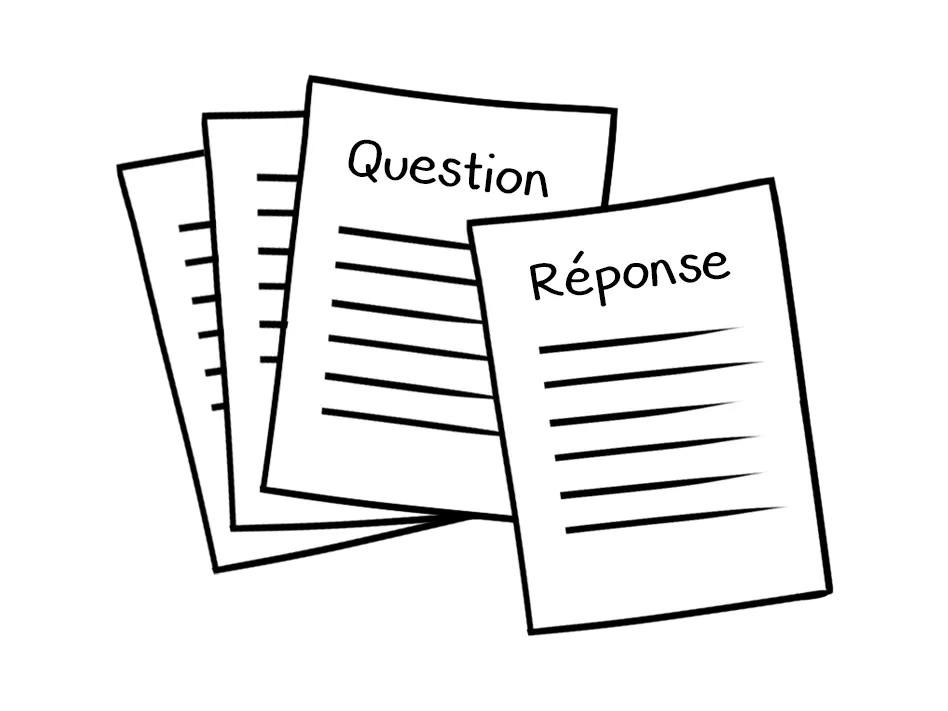
Chunking
Phenomenon of gradual aggregation of complex concepts into a single element. Thus experienced chess players who perceive entire games, where novices only see the position of a few pieces.
Mind map
Tree diagram where ideas and concepts are linked visually.
Case solved
Showing the learner a concrete example of how to solve a problem, step by step.
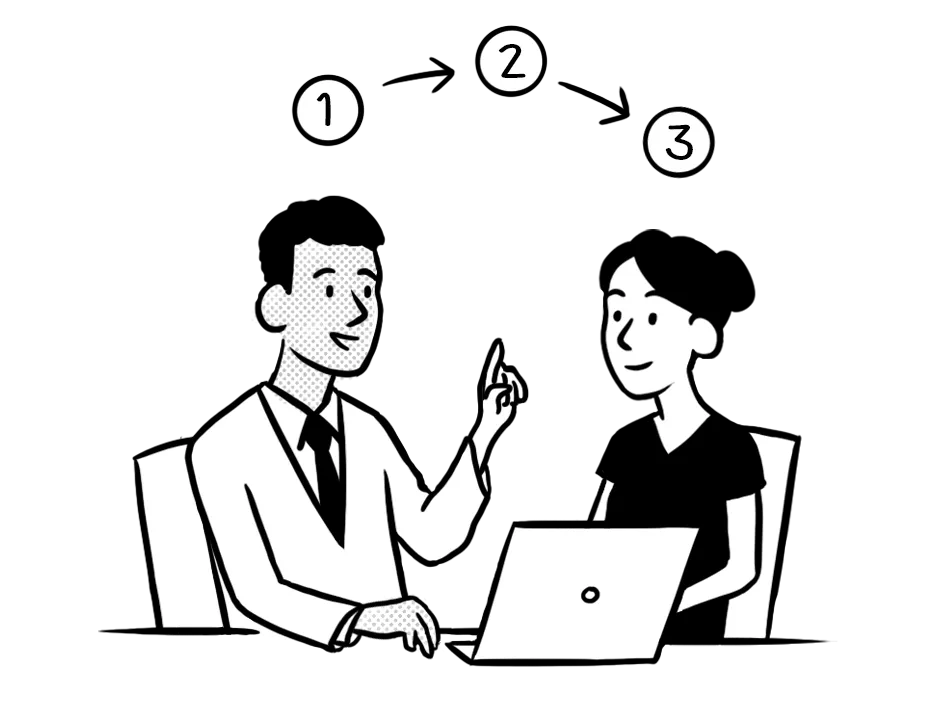
Consolidation
Second phase of learning where the brain stores information in memory so that it can be retrieved more easily later.
Docimology
Evaluation science.
Recovery effort
Refers to the effort made when we try to find information in our memory.
Encoding
First phase of learning where the brain perceives information and dissects its meaning.
Commitment
We say that a learner is engaged when he himself wants to learn what you want to transmit to him.
Cognitive issues
The cognitive challenge of a training course corresponds to the nature of the learning that will take place during it. For example: deconstructing erroneous representations or remembering new information.
Relevant error
What an untrained learner/without your intervention as a teacher is likely to do.
Evidence Based
This Anglo-Saxon expression is translated into French as 'based on evidence, on facts and on evidence'. It is used to explain that a subject is based on scientific research.
Feedback
Precise corrective feedback on learner behavior.
Asynchronous training
Learning is asynchronous when everyone follows the activity at their own pace. Example: an online video that is available at any time.
Synchronous training
Learning is synchronous: everyone is following the same activity at the same time. Example: a tutorial course.
Distance learning
Distance learning refers to any learning that takes place at a distance (for example on the Internet).

Face-to-face training
Face-to-face refers to any learning that takes place face to face (for example in the classroom).
Granule
A granule is a scenario or an information capsule integrated into a Didask digital learning module. It is associated with a specific cognitive challenge according to which its dynamics are modified in order to improve learning.
Hyperconnection
Maintaining a constant connection with your work, regardless of location and time.
Hypocognition
I am in hypocognition when I lack the basic elements to understand the situation in which I find myself.
Illusion of mastery
The illusion of control is our natural tendency to confuse “I know” with “I know I saw it.” Knowing that you have seen something gives you an impression of familiarity that is confused with real control.
Infobesity
Excess information exposes a person to cognitive overload, thus complicating the effective processing and understanding of the available data.
Generative artificial intelligence
An AI category that focuses on the autonomous creation of content, such as text, images, images, videos, sounds, and other types of data, by computer systems.
Educational artificial intelligence
An educational AI helps learners acquire knowledge and skills by using machine learning and natural language processing techniques to provide personalized recommendations and feedback based on the needs of each learner.
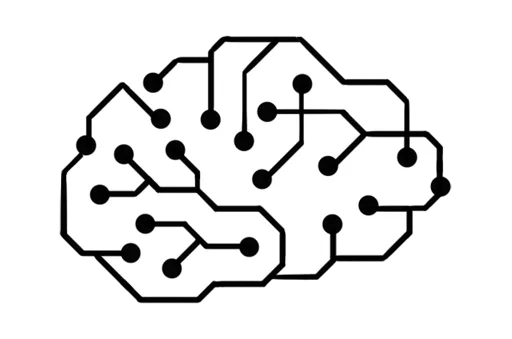
Knowledge Management
Knowledge and know-how management system, guaranteeing access to information for all teams in a company.
LCMS: Learning Content Management System
LCMS have the essential functionalities of the LMS and combine them with the creation of educational content. It is often less expensive and complex to set up.
Learner first
An approach where the focus is on the needs, interests, and development of learners.
LLM: Large Language Model
Artificial intelligence models developed by OpenAI designed to understand and generate text in the same way as humans using vast amounts of text data to learn the structure and characteristics of language.
LMS: Learning Management System
Type of platform dedicated to online learning. LMS were originally designed as tools for storing, managing, administering and distributing training courses and then analyzing them.
LTP: Learning Transformation Platform
3rd generation e-learning platform, combining expertise in cognitive sciences and Educational AI for optimal pedagogical effectiveness leading to the transformation of learners.
The LXP: Learning Experience Platform
This type of platform is intended for the learning experience and is aimed directly at the learner. He becomes an actor in his learning experience.
Machin Learning
Expression invented by Didask to group together all the new trendy training approaches and whose name combines an adjective and then “learning” (social learning, peer to peer learning, collaborative learning, mobile learning, etc.)
Machine Learning
Or machine learning. A branch of artificial intelligence where computers learn from data to make decisions or make predictions without being explicitly programmed.
Long-term memory
Long-term memory keeps track of our learning and then allows us to use it in new situations.
Working memory
Working memory stores relevant information from our environment according to our needs at the time. It can only store a certain amount of information at a time.
Growth mindset
I have a growth mindset when I think that skills can be developed while working.
Meta-analysis
Refers to a scientific study that itself includes several studies to check if their results are repeated.

Metacognition
The ability to know to distinguish what you know and what you don't know, and among what you don't know, how to learn it.
Fixed mentality
I have a fixed mindset when I think that skills are innate.
Situation
A learning technique consisting in immersing a learner in a simulated environment reproducing a real situation that he or she might encounter. At Didask, we use case scenarios to encourage a trial-error-feedback learning approach.
Educational modality
Refers to a type of activity to achieve an educational objective, for example a video.
Intrinsic motivation
It is a motivation that comes from within the individual himself. It is linked to the interest, pleasure, and personal satisfaction that comes from doing an activity or reaching a goal.
Extrinsic motivation
It is the interest that the learner has in elements of the learning experience that do not relate to the content of the training itself.

Micro learning
Microlearning is a learning format based on very short educational modules (generally between 3 and 5 minutes), which each focus on a specific concept to be assimilated, with a defined objective.
Neuroscience
Study of the anatomy and functioning of the brain.
Master's objective
If I have a master's degree goal, I especially want to improve my competence in this discipline.
Performance objective
If I have a performance objective, I especially want to be the best in my discipline.
Educational objective
What you want your learner to know or know how to do at the end of their apprenticeship.
Project-based pedagogy
Pedagogy consisting in directly confronting learners with concrete tasks: the learner progresses by trying to succeed in a larger project.
Active pedagogy
Refers to a set of teaching methods that all have in common the desire to make the student an actor in his learning.
Brain plasticity
The fact that our brain activity changes after each experience. Our brain, like modeling clay, keeps an imprint of past experiences.
Cognitive psychology
A sub-branch of psychology dedicated to the functions of human reasoning.
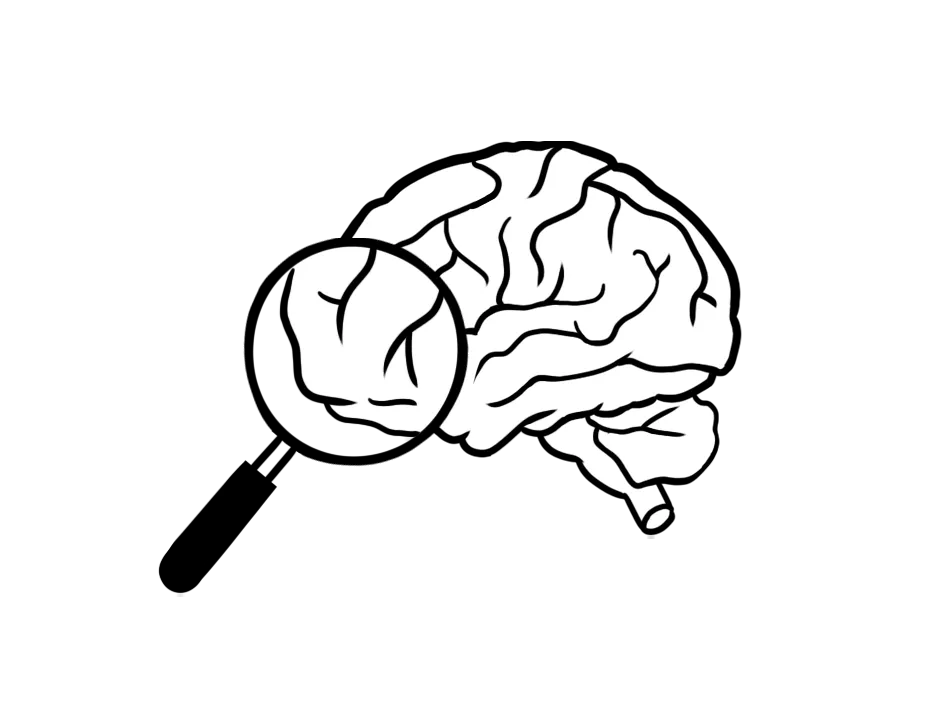
Progress
Measurement of the learner's increase in competence.
Mental shortcut
Technique for remembering information more quickly, such as a mnemonic (“but where is Ornicar?”)
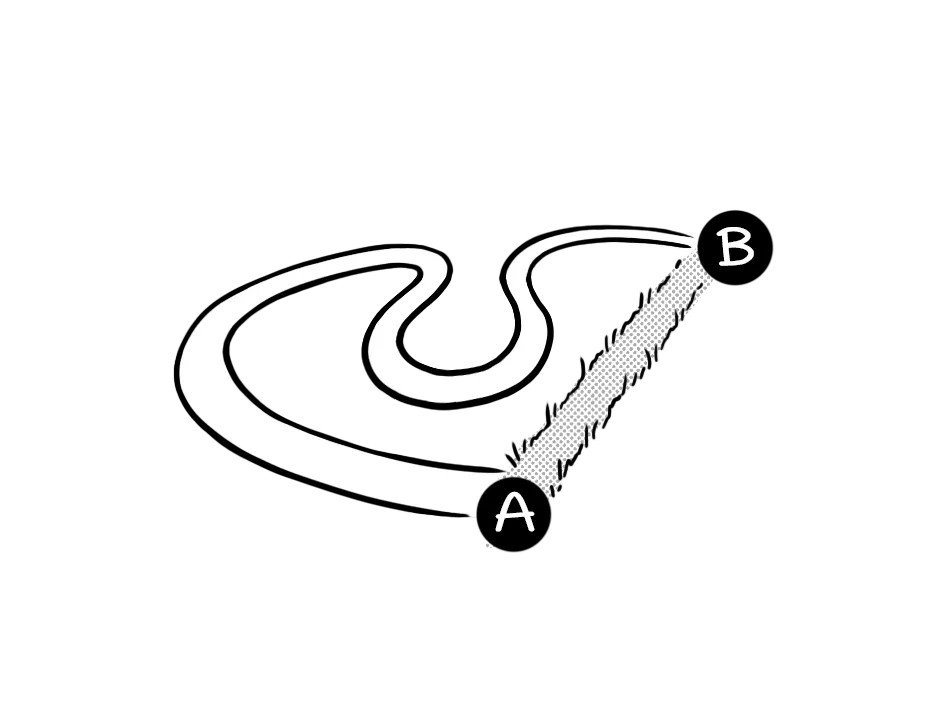
Active remobilization
The act of trying to find back to yourself what you have learned, for example by testing yourself or by trying to explain to someone else.

Spaced repetition
The act of trying to remobilize learning at intervals over time, for example every week after class.
Retention
Maintaining the rise in competence over time.
Cognitive science
Sciences that study the functions of human reasoning (attention, perception, emotion, learning...).
Instructional sequence
Refers to a series of educational activities spread over time in order to achieve a certain educational objective.
Educational sobriety
Educational simplicity means using the technologies at your disposal wisely. Sometimes 2 technologies mobilize the same cognitive processes in the learner, but one can add animations or complexity that hinder learning.
Testing effect
Effort to retrieve information from one's memory by tests rather than by rereading, to improve one's memory.
Transfer
Capacity of the learner to mobilize a skill in new situations.
Proximal development zone
Zone in which the difficulty of a challenge is neither too high nor too low: it is “just above” what the learner can do today.


